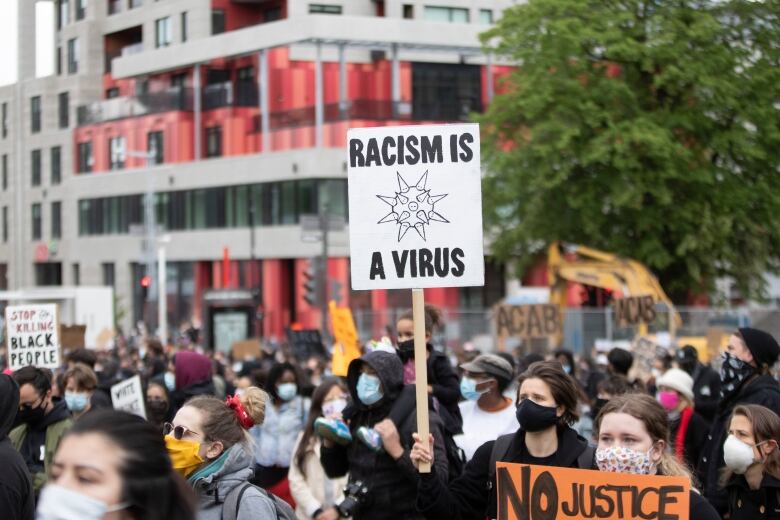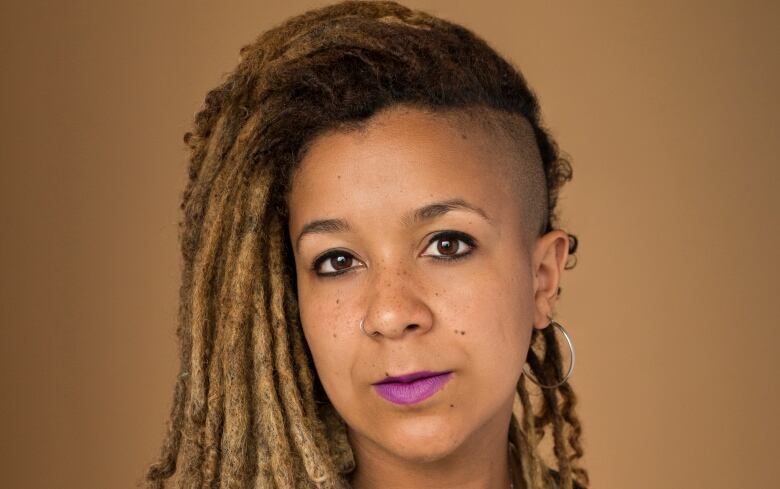As premier denies systemic racism, black Quebecers point to their lived experience
Racist policing a pattern in Canada, too, author says

When Verdun resident Alexandre Lamontagne saw the footage of George Floyd being killed by police in Minneapolis, Minn., he felt a surge of disappointment.
Lamontagne is the lead plaintiff in a racial profiling lawsuit against the City of Montreal. He claims he was wrongfully detained by Montreal policewhile walking home at night in Old Montreal.
"They put their knee on my neck, like they did to George Floyd," Lamontagne said.
A medical examiner on Monday classifiedFloyd's death as a homicide, saying his heart stopped as police restrained him and compressed his neck.
Following Floyd's death, protests erupted across the United States and around the world, demanding an end to systemic racism and police brutality.
Lamontagne says he was walking outside a nightclub in August 2017 when police officers started yelling at him.
He was ticketed as well as charged with resisting arrest and obstruction of justice. The charges were dropped a year later.
Lamontagne recognizes the parallels between his encounter with police and Floyd's.
"It's very sad it's inhumane, killing someone for no reason," Lamontagne said. "It's time for people to wake up and protest against racism. It's not black against white, it's all of us united against racism."

'Who keeps us safe?'
On Sunday, thousands of Montrealers braved the risks of the COVID-19 pandemic and took to the streets in a call to end police violence against black people.
Even though the incident that sparked protests around the world took place in the United States, Robyn Maynard, author of Policing Black Lives: State Violence in Canada from Slavery to the Present,says violent, racist policing is a pattern here in Canada, too.
"That attention is only paid when something is happening in the United States is very much an insult to people living here who are undergoing violence every day," Maynard said.
In the context of the pandemic, the systemic racism in our society becomes even more clear, she said.
She noted the high proportion of women of colour working in essential services jobs, such as those in Quebec's long-term care facilities, where outbreaks and deaths have been most severe.
"These are the people being essentially sacrificed in the name of public health," Maynard said.

Smaller reforms to police forces, such as increasing mental health services and sensitivity training, are no longer sufficient for activists calling for change, she said. Calls for funds to be divested from police forces into things "that would actually keep people safe," such as public housing and transit, are growing louder.
"People are calling into question, what is public safety? Who keeps us safe?" she said.
Premier denies there is systemic racism in Quebec
Premier Franois Legault said Monday he "stands in solidarity with people who denounce racial violence" though he denied, once again, that there was a systemic problem in Quebec.
"I think that there is some discrimination in Quebec, but there's no systemic discrimination, no system in Quebec of discrimination," he said, adding "it's a very small minority of the people who are doing some discrimination."
He did, however, point out thata government committee is currently reviewing police work in the province, and racial profiling will be part of the examination.
When questioned about the Sunday's protest, SPVM spokesperson Insp. Andr Durocher said systemic racism was present in the force and suggested the protest was fuelled by what happened to George Floyd, rather anything in Montreal.
But he acknowledgeda 2019 report, whichshowed black and Indigenous people were four to five times more likely to be stopped by police than white people.
Montreal Mayor Valrie Planteacknowledged there is systemic racism in all parts of society, including the SPVM.
She also said last year's studyon body cameras, which determined the policing tool would not be viable in Montreal, could be revisited.
Lateef Martin, who spoke at the protest, says that in refusing to acknowledge the problem head-on, authorities are going to create more problems.
"It's quite frankly embarrassing that police doesn't admit this or even acknowledge it," Martin said. "There's going to be another Fredy Villanueva because the problem isn't being addressed," he said, referring to theteen who was killed by police in Montral-Nord in 2008.
The death caused the Quebec government to reform how police shootings are investigated in the province.
In 2019, Martin contested a ticket he was issued for walking on a residential street on an icy night. He claims the officers who ticketed him were motivated by race. He says acknowledging systemic racism is the first step before anything changes for the better.
"This is a problem that our country has always had," Martin said. "It's so frustrating, because people don't seem to understand that it's not just a black problem it affects everyone."
Watch: Protests call out problems with policing in Canada
With files from Simon Nakonechny and Alison Northcott













_(720p).jpg)


 OFFICIAL HD MUSIC VIDEO.jpg)
.jpg)



























































































